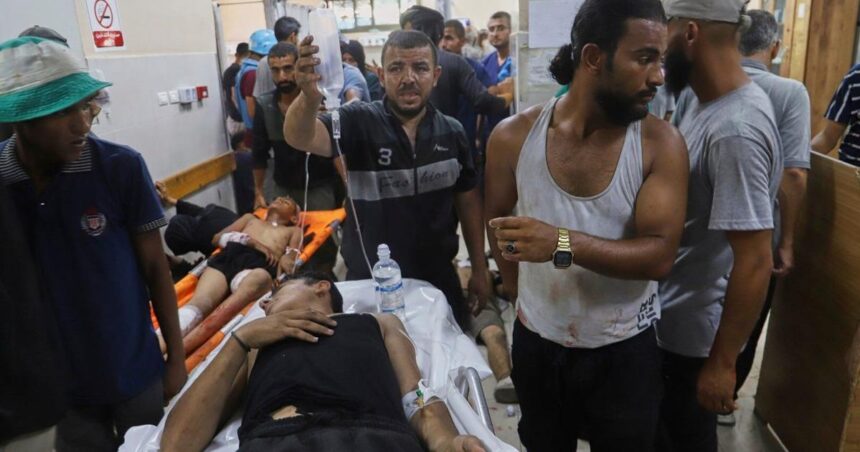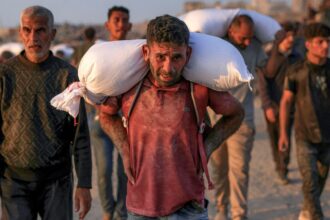In a devastating escalation that underscores the dire humanitarian crisis in Gaza, Israeli forces opened fire on Palestinians gathering at food distribution points Thursday, killing at least 22 people and wounding dozens more, according to Palestinian health officials. The incident has triggered immediate international condemnation and intensified calls for sustainable humanitarian corridors in the besieged territory.
The shootings occurred at multiple aid distribution sites in northern Gaza, where thousands of desperate civilians had gathered hoping to receive flour and essential supplies. Witnesses described scenes of chaos as gunfire erupted into crowds of hungry people, many of whom had been waiting for hours in what has become an increasingly desperate search for sustenance.
“People were simply trying to feed their families when the shooting began,” said Ahmed Khalil, a Gaza resident who witnessed the incident. “There was no warning. Suddenly bullets were flying and people were falling. We’ve been without proper food for months.”
The Israeli military offered a different account, claiming their forces had fired at individuals who posed a threat by approaching restricted military zones. They stated soldiers used “precise fire” after issuing warnings, though this contradicts multiple eyewitness testimonies collected by international aid workers in the area.
This incident occurs against the backdrop of what the United Nations has described as a “catastrophic” humanitarian situation in Gaza. Recent World News reports indicate approximately 80% of Gaza’s 2.3 million residents have been displaced since the conflict began following Hamas’ October 7 attack, with critical shortages of food, medicine, and clean water throughout the territory.
The UN World Food Programme suspended aid deliveries to northern Gaza last month due to security concerns, further exacerbating the crisis. Philippe Lazzarini, Commissioner-General of UNRWA, the UN agency for Palestinian refugees, described the situation as “a complete breakdown of civil order driven by sheer desperation.”
International reaction was swift and severe. UN Secretary-General António Guterres called the incident “unconscionable” and demanded an immediate independent investigation. The European Union’s foreign policy chief Josep Borrell stated that “targeting civilians at humanitarian aid points constitutes a serious violation of international humanitarian law.”
The United States, Israel’s closest ally, expressed “deep concern” over the deaths. Secretary of State Antony Blinken called Israeli Defense Minister Yoav Gallant, emphasizing the need to ensure civilian protection and increase humanitarian aid flow, according to State Department officials familiar with the call.
Meanwhile, Canada News sources report that Prime Minister Justin Trudeau has joined other world leaders in calling for restraint and adherence to international humanitarian law. “The protection of civilians must be paramount,” Trudeau stated during a press conference in Ottawa. “Canada continues to support efforts to deliver humanitarian assistance to those in desperate need.”
Humanitarian organizations on the ground report increasingly dangerous conditions for both civilians and aid workers. Médecins Sans Frontières (Doctors Without Borders) described “overwhelming casualties” at Al-Shifa Hospital, where medical staff struggle with limited supplies and electricity to treat the wounded.
This latest violence comes as ceasefire negotiations mediated by Qatar and Egypt have stalled repeatedly. Hamas officials claim the incident demonstrates Israel’s lack of commitment to peace, while Israeli officials maintain security measures are necessary to prevent weapons smuggling and terrorist activities.
As night fell over Gaza, families mourned their dead while international diplomacy accelerated. The question now confronting world leaders is stark: How many more civilians must die before effective protection mechanisms and reliable humanitarian corridors are established in a conflict zone where hunger has become as deadly a threat as bullets and bombs?


















